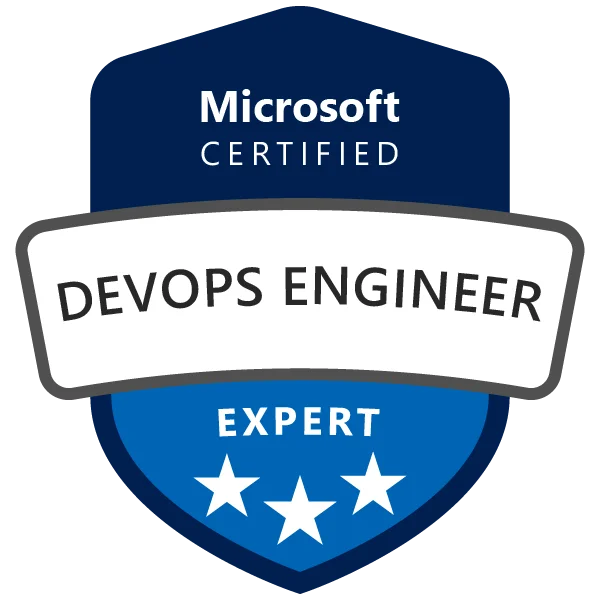Get new IT skills, get certified and lift your IT career to new heights without breaking the bank!
Unlimited Training - IT Courses and Certifications made simple and insanely affordable. Get access to 60+ LIVE instructor-led Courses for the price of less than one course.











course: Microsoft Certified DevOps Engineer (AZ-400)
Duration: 4 days
Format: Virtual or Classroom


Overview
AZ-400, known as Microsoft Certified: DevOps Engineer Expert, is a certification validating skills in implementing DevOps practices on Azure. Achieving this certification demonstrates expertise in areas like version control, continuous integration, continuous delivery, infrastructure as code, and more. Elevate your career with AZ-400, showcasing your proficiency in optimizing and managing DevOps processes within the Azure environment for enhanced software delivery.
 Instructor-led training
Instructor-led training Practice test
Practice test Pre-reading
Pre-reading Personal Learning Path
Personal Learning Path Certification Guarantee
Certification Guarantee Email, chat and phone support
Email, chat and phone support









Who is this course for?
The Microsoft Certified DevOps Engineer (AZ-400) certification is designed for professionals who are responsible for designing, implementing, and maintaining DevOps processes and practices in an organization. The certification is ideal for individuals who have experience with DevOps practices and want to validate their skills and knowledge in this area. The AZ-400 certification covers various topics related to DevOps engineering, such as implementing DevOps development processes, implementing continuous integration and delivery, implementing dependency management, implementing application infrastructure, and implementing continuous feedback. The course teaches you how to design, implement, and maintain DevOps processes and practices using Microsoft Azure and other DevOps tools and technologies.
Curriculum
Preparation
At Readynez, we provide many resources and have experienced experts in the field. That is why we are also very successful with many satisfied customers. You can therefore safely take your course with us. In order to take the AZ-400 Azure DevOps course, however, some prerequisites are required.
You have the perfect starting point to take the course with these prerequisites:
Meet some of the Readynez Instructors you can meet on your course. They are experts, passionate about what they do, and dedicated to give back to their industry, their field, and those who want to learn, explore, and advance in their careers.

Tiago Costa is Microsoft MVP and a Cloud Architect and Advisor and International speaker on the Microsoft Cloud.
Tiago Costa is a Cloud Architect and Advisor on Microsoft Azure. For the past years he has been architecting and developing solutions using Microsoft Azure for some of the fortune 500 companies.
Due to his strong real-world experience, Tiago regularly teaches Microsoft Azure classes around the world. Microsoft Azure MVP since 2016 for his community efforts in promoting and sharing knowledge with the community.
Tiago has 40+ Microsoft Certifications including MCT – Microsoft Certified Trainer - and got awarded as MCT Regional Lead every year since 2016. He’s the founder of the Azure Portugal User Group. He loves diving into new technologies and to share his experience at conferences and training classes, but what excites him about his work is to help others exploring new frontiers in technology impacting their life’s, making the world a better place for everyone. His free time is spent with his family in the sunny Lisbon, Portugal building cool and geek projects

Jens is a 20-year MCT, an Amazon Authorized Champion Instructor and a well accomplish Cloud Infrastructure Security Consultant and Penetration Tester.
Jens Gilges is a highly skilled professional with expertise in Azure, AWS, and Penetration Testing. With a remarkable 20-year tenure as a Microsoft Certified Trainer (MCT), Jens has honed his proficiency in various Microsoft technologies. Notably, he is not just a trainer but an industry leader, holding the prestigious title of AWS Champion Instructor.
Jens is dedicated to imparting his knowledge globally, delivering top-tier security and AWS training to clients across the world. His passion for these cloud platforms shines through in his engaging and informative sessions. Whether you're seeking insights into Azure's versatile capabilities, AWS's vast infrastructure, or the intricacies of Penetration Testing, Jens is your go-to expert.
With Jens at the helm, you can expect a comprehensive learning experience that combines years of expertise with a commitment to staying at the forefront of cloud technologies. Join him on a journey of continuous learning and explore the ever-evolving landscapes of Azure, AWS, and Penetration Testing.
FAQ
AZ-400 is the Microsoft Certified: DevOps Engineer Expert certification. It validates the skills and knowledge required to design and implement DevOps practices on Microsoft Azure. Professionals with this certification demonstrate expertise in areas such as version control, continuous integration, continuous delivery, infrastructure as code, and monitoring and feedback.
Unlock your potential with the AZ-400 certification – Microsoft Certified: DevOps Engineer Expert. Join our comprehensive course at Readynez, where we specialize in guiding individuals and teams to success in certification exams. Embrace the future of DevOps, master Azure practices, and enhance your career. Become certified with us and open doors to exciting opportunities in the dynamic field of cloud-based DevOps engineering. Your success starts here.
To attain the AZ-400 certification, aspiring candidates should ideally have hands-on experience with Azure administration, Azure development processes, and an in-depth understanding of both Azure DevOps and Git. Familiarity with Agile and Scrum methodologies is beneficial, and a foundational knowledge of continuous integration, continuous delivery, and version control is highly recommended.
The cost of AZ-400 certification exam costs anywhere from €150 - €228 depending upon your location and currency exchange rate.
The AZ-400 exam syllabus covers various topics related to Azure DevOps Services and DevOps practices. The key areas include:
Yes, the AZ-400 certification, "Designing and Implementing Microsoft DevOps Solutions," is highly valuable for individuals pursuing a career in DevOps and cloud-based development. It demonstrates your expertise in using Azure DevOps Services and implementing DevOps practices, making you a valuable asset to organizations adopting modern software development methodologies.
The time it takes to become AZ-400 certified varies depending on individual factors such as prior experience, knowledge, and the time commitment for preparation. On average, candidates may spend several weeks to a few months preparing for the exam through self-study, online courses, or instructor-led training programs.
The AZ-400 certification exam can be either taken online or through a certified Pearson VUE test center.
The difficulty of passing the AZ-400 exam depends on individual factors such as prior experience, knowledge, and preparation efforts. The exam is designed to assess skills in implementing DevOps practices with Microsoft Azure technologies. Candidates with hands-on experience in Azure DevOps and thorough preparation through study materials, practice tests, and practical application are more likely to succeed.
To obtain the certificate, a minimum score of 700 out of 1000 is required, with a passing threshold of 70%.
To maintain your AZ-400 certification, you need to earn 40 Continuing Professional Education (CPE) credits each year, with a minimum of 20 CPEs earned in each of the two ISACA domains. You can obtain CPEs through various activities, such as attending conferences, participating in training courses, or engaging in professional development activities related to information systems audit, control, and security.
The average salary for professionals with AZ-400 certification can vary based on factors such as experience, location, and the specific job role. On average, individuals holding the AZ-400 certification can earn salaries ranging from €82,278to €1,09,735 annually, with the potential for higher earnings based on expertise and seniority.
Reviews

Well prepared teacher with a great combo of pedagogical and technical skills.

Very good and informative course with a good instructor that was good explaining to someone who hasnt used DevOps as much.
Why Pay More??
Why settle for just one certification course when you can attend ALL certification courses for the price of less than one single course?

A perfect tool to help us develop the skills and competencies we need for success
 Kasper Meyer Christensen
Kasper Meyer Christensen
Businesses leveraging Readynez Unlimited save at least 50% on their training and certifications - and many up to 80%
Unlimited license holders attend on average 2.4 courses per year

For the price of less than one course.

Just cheaper and more flexible.

The easiest, most flexible and cheapest way to get Certified.

Attend as many courses you want - no limitations!

Refund provided if license costs surpass the value of your training.

Interact 1-on-1 with 50+ seasoned instructors.

